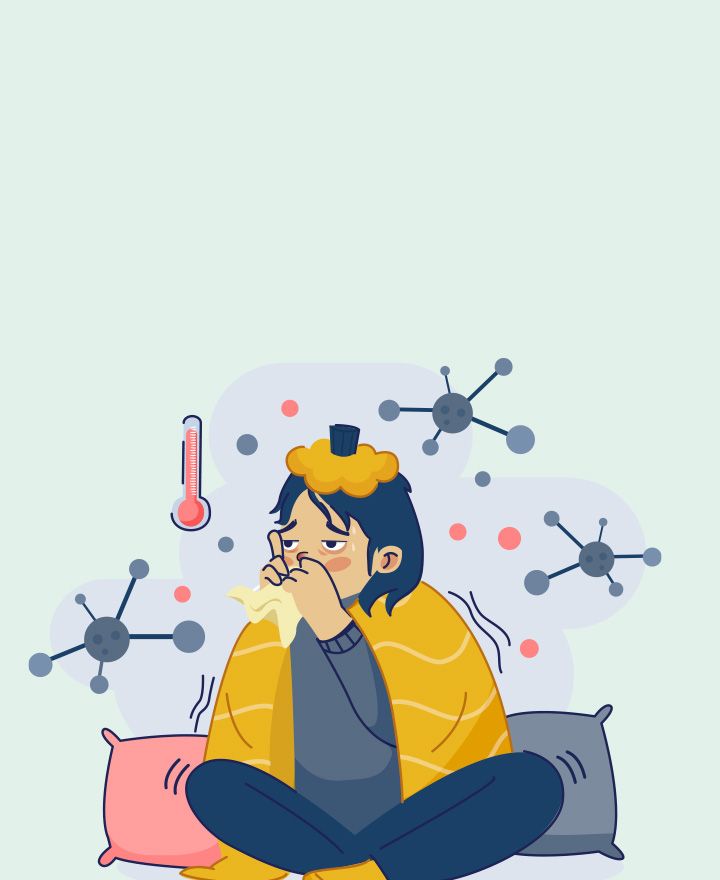

Symptoms of Dengue in Infants
Dengue is one of the common ailments that infants under 12 months of age are diagnosed with. The symptoms of dengue are almost similar to the ones they get during a viral fever. Hence, the symptoms of dengue in infants are not usually noticed on time because most parents mistake a dengue fever for a viral fever. Fortunately, dengue fever can be treated effectively, if the symptoms are detected on time. Take a look at this article to know more about the signs to watch out for dengue fever in babies so that you can be well-prepared.
What is dengue fever in infants?
Dengue fever in infants is a viral infection caused by the dengue virus, which is transmitted primarily by Aedes mosquitoes. In infants, the disease can be more severe than in older children or adults, and it often presents with atypical or subtle symptoms.
Babies living near stagnant water bodies are more prone to dengue fever than others as these surroundings are a breeding ground for mosquitoes. Babies under 12 months of age affected with dengue fever may have a fever for 10 days or more.
Symptoms of dengue in infants
The dengue fever symptoms in infants includes:
• Sudden high or low body temperature that goes up to 1040F or sometimes comes down to less than 96.80F
• Pain or discomfort at the back of the eyes
• Headache, body pain, or severe tiredness
• Nausea accompanied by vomiting and diarrhoea
• Severe pain in the joints and muscles
• Skin rashes, which usually occur a day or two after the onset of fever; rashes are usually flat or slightly raised
• Occasional nosebleeds
• Bleeding in the gums
• Sudden loss of appetite
• Crankiness and irritability
• Trouble while breathing due to excessive coughing, wheezing, and other respiratory difficulties
Stages of symptoms
These infant dengue symptoms differ depending on the stage of dengue your baby is diagnosed with. Dengue in babies can be one of the following three types:
• Febrile Stage –
First stage, where the fever stays for 2 to 7 days; symptoms include irritability, muscle pain, nausea, and skin rashes
• Critical Stage –
Hospitalisation may be needed, as symptoms include vomiting blood, severe bleeding in the nose and gums, blood in the stools, breathlessness and crankiness
• Recovery Stage –
Symptoms start to disappear gradually; the baby starts to recover, but continuous monitoring is important until the baby has recovered completely
Once you notice the dengue fever symptoms in infants, you should seek medical help immediately. Treatment for dengue in infants is generally supportive, focusing on maintaining hydration, managing fever, and monitoring for signs of complications. There is no specific antiviral treatment for dengue, so prevention (through mosquito control and avoiding mosquito bites) is key.
Conclusion
Watch out for symptoms of dengue in infants because dengue can be easily treated if detected early. Keeping your surroundings clean and making your baby stay indoors as much as possible can help prevent the risk of dengue in babies. Keep your baby and your family covered against dengue and other illnesses by choosing health insurance online.
To know more about Wellness and other health related tips, visit the wellness corner .
Source: acko.com, dettol.co.in, unicef.org
Disclaimer: This blog provides general information and discussions about health and related subjects. The information and other content provided in this blog, website or any linked materials are not intended and should not be considered or used as a substitute for medical advice, diagnosis, or treatment. Kindly contact your doctor before starting a new medicine or health regime.
Related Articles
Signs & Symptoms of Pneumonia in Infant
Food Allergies in Infants- What Every Parent Needs to Know
Understanding the Sucking Reflex in Infants
Bacterial Meningitis in Infants
Poor Feeding in Infants - Causes & Remedies
Published on December 12, 2024


 Health Insurance
Health Insurance  Travel Insurance
Travel Insurance  Car Insurance
Car Insurance  Cyber Insurance
Cyber Insurance  Critical Illness Insurance
Critical Illness Insurance
 Pet Insurance
Pet Insurance
 Bike/Two Wheeler Insurance
Bike/Two Wheeler Insurance  Home Insurance
Home Insurance  Third Party Vehicle Ins.
Third Party Vehicle Ins.  Tractor Insurance
Tractor Insurance  Goods Carrying Vehicle Ins.
Goods Carrying Vehicle Ins.  Passenger Carrying Vehicle Ins.
Passenger Carrying Vehicle Ins.  Compulsory Personal Accident Insurance
Compulsory Personal Accident Insurance  Travel Insurance
Travel Insurance  Rural
Rural